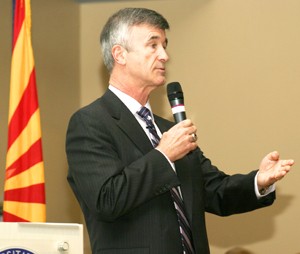A third town hall meeting took place last night in the South Grand Ballroom of the Student Union Memorial Center, where President Robert Shelton addressed a crowd of nearly 300 staff and faculty on the looming UA transformation.
“”The core question is . . . are we running the UA like it’s supposed to?”” Shelton said.
The meeting was scheduled after an overwhelming response to the previous two, designed to answer further questions before the impending deadline of the white paper proposals Oct. 13.
“”The goal should always be to be more excellent and to do the things we have to do to be a great public university,”” Shelton told the audience. “”I can’t do my job without you. I need your input. I need the point of the professionals. I need faculty input. I need student input.””
Shelton stressed the immediacy of the situation and the necessity of the university’s transformation proposal to be completed by the end of year. According to Shelton, the short term will not be good for the UA, and this year through the fiscal year of 2010 will be very difficult. Eliminating activities and expediting student graduation were issues Shelton briefly mentioned, while insisting that tenure-tracked faculty would not lose their jobs.
In light of budget cuts, which Shelton said have been occurring consistently over the last 10 years, many UA employees expressed concern about the situation, and wonder how the transformation will affect them.
“”How do I keep those who remain motivated?”” asked an employee of Parking and Transportation.
“”What we’re trying to get past is having to do this (budget cuts) year after year after year. So please tell them (employees) that we are serious about this. I expect us to come out stronger in the end,”” Shelton said.
Shelton stressed the importance of audience, faculty and staff opinions as well as his reliance on them. The meeting was catered to individuals with concerns from not only the UA campus, but also the UA South campus and the College of Medicine in Phoenix.
“”What actions did the administration plan to take . . . that could stop lay-offs that loom ahead?”” asked Tom Gelsinon, program coordinator for the Mexican American Studies department.
Shelton admitted to the sensitivity of the issue before asking, “”Can we find alternatives to straightforward lay-offs, where we might have more gentle reductions? The answer to . . . that is yes, in the sense that we need to think about all possibilities.””
Thursday’s meeting was the final one before the deadline of the white paper proposals. Shelton insisted that changes may be made to proposals after the deadline, and that it will not be until Dec. 15 that the transformation proposal will be complete. Shelton made no comments, however, on possible future meetings to discuss the transformation issues.









